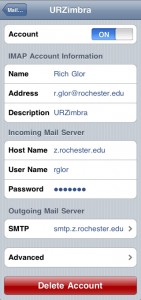Category Archives: Nuggets of Wisdom
Words of Wisdom from Nelson Hairston Sr.
Quinn has been entertaining us with insightful quotes by the famous ecologist, Nelson Hairston Sr. Some of the best can be found in an obituary published a few years ago in Bulletin of the Ecological Society of America, including:
“If p is less than 0.01, you worked too hard.”
“If it’s not worth doing; it’s not worth doing well.”
“Some ecologists find mathematics easier than useful scientific work.”
“If our ignorance is infinite…”
Every first year feels it constantly. Second years feel it in droves, especially around qualifying exam time. A PhD student’s career is capped by a defense that makes sure you still feel it a little. What is it? Stupidity! Here’s a good article from the Journal of Cell Science with a new perspective on “The importance of stupidity in scientific research.” – Dan McNabney
.
Rochester Breaks Into Top 10 on Daily Beast’s List of Smartest Cities
The Daily Beast has made an annual tradition of using data on education (e.g., % population with degrees) and intellectual environment (e.g., libraries per capita, year-to-date nonfiction book sales) to rank the smartest major metropolitan areas in the United States. This year Rochester cracked the top 10, just behind Washington, D.C. and just ahead of Portland, Oregon (take heart Portland, in my book you’re still leading the nation in hipsters per capita).
Software Site Licenses
 It’s become clear recently that not everyone knows about the University of Rochester’s Software Site License Program (requires UR NetID Login). In a nutshell, this program provides a variety of software packages at a significant discount (sometimes free) to people associated with the U of R. Of particular relavance to EEBers are two free programs: Endote X4 and Mathematica (for students only). – Anthony Geneva
It’s become clear recently that not everyone knows about the University of Rochester’s Software Site License Program (requires UR NetID Login). In a nutshell, this program provides a variety of software packages at a significant discount (sometimes free) to people associated with the U of R. Of particular relavance to EEBers are two free programs: Endote X4 and Mathematica (for students only). – Anthony Geneva
Good News for U of R iPhone Users
 “Zimbra migration” might evoke images of unusual African ungulates moving across the Savannah, but it’s really just the University of Rochester IT department’s way of describing our move to a new e-mail client. It seems like most people have managed to make it through this migration with minimal headaches. In most ways the new client appears superior to the old ‘mail.rochester.edu’ system. One major problem with the old system was its inability to play nice with the iPhone, causing some folks to switch over to using third party services like Gmail as their primary accounts and others to move to the University’s Microsoft Exchange server (ur.rochester.edu). With Zimbra, working with the iPhone is pretty simple (see image to the right for the appropriate settings [go to “Settings:Mail,Contacts,Calendars:Add Account…” to access this screen]). If you’re like me and switched over to the Exchange server, there is at least one good reason to move over to Zimbra: the maximum mailbox size on the Exchange server is a mere 200 MB, whereas you get 7 GB on Zimbra.
“Zimbra migration” might evoke images of unusual African ungulates moving across the Savannah, but it’s really just the University of Rochester IT department’s way of describing our move to a new e-mail client. It seems like most people have managed to make it through this migration with minimal headaches. In most ways the new client appears superior to the old ‘mail.rochester.edu’ system. One major problem with the old system was its inability to play nice with the iPhone, causing some folks to switch over to using third party services like Gmail as their primary accounts and others to move to the University’s Microsoft Exchange server (ur.rochester.edu). With Zimbra, working with the iPhone is pretty simple (see image to the right for the appropriate settings [go to “Settings:Mail,Contacts,Calendars:Add Account…” to access this screen]). If you’re like me and switched over to the Exchange server, there is at least one good reason to move over to Zimbra: the maximum mailbox size on the Exchange server is a mere 200 MB, whereas you get 7 GB on Zimbra.
Keeping Current with RSS
 With an ever-growing number of journals, the growing trend of early on-line publication, and the appearance of new research and commentaries in blogs and other informal sources, keeping up on all the latest research is one of the biggest challenges to ecologists and evolutionary biologists. Fortunately, RSS (Really Simple Syndication) is a new tool that makes this task easier than ever. By subscribing to RSS feeds from your favorite journals and blogs, you will have the latest research delivered directly to you, the moment it is released. The first step to using RSS is to get an aggregator. There are lots of aggregator options, but I use the on-line application Google Reader (requires sign-up) and the Apple OSX application NetNewsWire (which will import subscriptions through a Google Reader account). Once you have an aggregator, you simply sign up for the RSS feeds of your choosing. Feeds that I subscribe to include: Evolution (see “Sign up for RSS feed” link to left of screen), American Naturalist (see RSS link at right of screen), Systematic Biology (scroll down for options), Molecular Ecology (see “Sign up for RSS feed” link to left of screen), and Molecular Phylognetics and Evolution (see “New Article Feed”). And, of course, don’t forget about the feeds for your favorite blogs like dechronization, Tree of Life, EEB and Flow, and iPhylo. How you subscribe will depend on the aggregator you’re using, but in most cases you just need to copy the link provided on the pages linked above and paste it into the dialogue box after reguesting to add a subscription in your aggregator. Make Google Reader (or iGoogle) your homepage and you’ll soon be seeing the newest stuff everytime you hop onto the web!
With an ever-growing number of journals, the growing trend of early on-line publication, and the appearance of new research and commentaries in blogs and other informal sources, keeping up on all the latest research is one of the biggest challenges to ecologists and evolutionary biologists. Fortunately, RSS (Really Simple Syndication) is a new tool that makes this task easier than ever. By subscribing to RSS feeds from your favorite journals and blogs, you will have the latest research delivered directly to you, the moment it is released. The first step to using RSS is to get an aggregator. There are lots of aggregator options, but I use the on-line application Google Reader (requires sign-up) and the Apple OSX application NetNewsWire (which will import subscriptions through a Google Reader account). Once you have an aggregator, you simply sign up for the RSS feeds of your choosing. Feeds that I subscribe to include: Evolution (see “Sign up for RSS feed” link to left of screen), American Naturalist (see RSS link at right of screen), Systematic Biology (scroll down for options), Molecular Ecology (see “Sign up for RSS feed” link to left of screen), and Molecular Phylognetics and Evolution (see “New Article Feed”). And, of course, don’t forget about the feeds for your favorite blogs like dechronization, Tree of Life, EEB and Flow, and iPhylo. How you subscribe will depend on the aggregator you’re using, but in most cases you just need to copy the link provided on the pages linked above and paste it into the dialogue box after reguesting to add a subscription in your aggregator. Make Google Reader (or iGoogle) your homepage and you’ll soon be seeing the newest stuff everytime you hop onto the web!

